 Making blogging too easy seems to be making it hard. It may be coincidence, but one example of “too easy” blogging is the spam blog, or splog – and suddenly, there’s a rash of upset bloggers who have had their blogs blacked.
Making blogging too easy seems to be making it hard. It may be coincidence, but one example of “too easy” blogging is the spam blog, or splog – and suddenly, there’s a rash of upset bloggers who have had their blogs blacked.
The latest example, listed on “the other Inquirer” tells the sad tale of a long-term addict to public navel-gazing: “I have been blogging since April 16, 2004, a day after my youngest daughter was born. On March 8, 2006, I was surprised to find my blog locked,” he writes.
The villain – as listed – is Blogger. Blogger has several tools designed to stop your public diary from being filled up with spam. And understandably! – there’s really nothing more frustrating than posting a deeply-held opinion, and coming back a day later to find it full of dozens, even hundreds, of comments that actually aren’t comments at all. They’re simply spam: “Great blog! You might like to read about my organ enhancement products on *www.biggusdickus.blogspot.com” and all pointing to the same crooked site.
 And a spam blog is something that doesn’t actually have any real content. It’s just links to trackback pointers for everybody else. The trouble is, all the signs of a spam blog are caused by the ease with which they are built. You just have to create the blog (two clicks) and then set up a robot that scours the web for new posts, and links to the trackbacks.
And a spam blog is something that doesn’t actually have any real content. It’s just links to trackback pointers for everybody else. The trouble is, all the signs of a spam blog are caused by the ease with which they are built. You just have to create the blog (two clicks) and then set up a robot that scours the web for new posts, and links to the trackbacks.
So, the coincidence: just before he got black-listed, our navel gazer switched to a blog automator. The product is one of so many I can’t make myself go there. It’s called Qumana, and what it does (amongst other things) is allow you to create your blog quickly and easily, including advertising, even if you’re offline. You’ll get an idea of the scale of the problem if you look at Technorati’s tag for Qumana.
Yes, in a fit of egotism, idiocy, the authors decided to write software that creates a tag for qumana for every blog page that is created on qumana. It doesn’t matter whether the subject is carrots, cameras or carcases; the tag for Qumana will also be created. As a result, you’ll have real trouble finding what the current discussion about Qumana is about; it’s lost in the backgroud noise.
 I’m not saying that Qumana is what caused the blog to be blacked. I am saying that if it produces a series of random, unrelated tags to a single site, it’s going to fulfil one of the prime indicators of a splog. And when random, unrelated blog entries all get tagged “Qumana” whatever their subject, you have something so similar, it’s going to be quite hard to see what a blog provider can do to filter it.
I’m not saying that Qumana is what caused the blog to be blacked. I am saying that if it produces a series of random, unrelated tags to a single site, it’s going to fulfil one of the prime indicators of a splog. And when random, unrelated blog entries all get tagged “Qumana” whatever their subject, you have something so similar, it’s going to be quite hard to see what a blog provider can do to filter it.
So our injured blogger has moved from Blogger to WordPress – which is something that could be said about better publications than his – and Blogger has instituted a standard “are you human?” check. But the real problem is that if you make blogging so easy that anybody can do it, anybody (or are splog creators things) will do it. And quality and quantity are not always good bedfellows.
*( for Monty Python fans, that is not a real URL! – yet)
 Several forests are having to be torn down to supply Google with enough chequebooks to keep up with their current spending spree.
Several forests are having to be torn down to supply Google with enough chequebooks to keep up with their current spending spree. Bought for an undisclosed sum, a statement on @LastSoftware’s site details how they fluttered eyes at each other a wireframe table: “We got to know a bunch of Googlers while we were building the Google Earth plug-in for SketchUp, and it quickly became apparent that we could really stir things up together.”
Bought for an undisclosed sum, a statement on @LastSoftware’s site details how they fluttered eyes at each other a wireframe table: “We got to know a bunch of Googlers while we were building the Google Earth plug-in for SketchUp, and it quickly became apparent that we could really stir things up together.” “Google’s resources will allow us to serve our current users better, and Google’s reach will allow us to expose more people to SketchUp in one year than we could have touched in 10 years on our own,” he commented in a budsy message to customers.
“Google’s resources will allow us to serve our current users better, and Google’s reach will allow us to expose more people to SketchUp in one year than we could have touched in 10 years on our own,” he commented in a budsy message to customers. The combination of SketchUp’s 3-Dimension models overlaid on Google Earth’s maps could serve up a competition busting offering, with the added detail offering real value to GPS users.
The combination of SketchUp’s 3-Dimension models overlaid on Google Earth’s maps could serve up a competition busting offering, with the added detail offering real value to GPS users.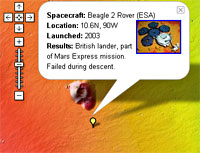 Google’s plans for galaxy-spanning domination have continued apace with the launch of Google Mars, giving surfers the opportunity to explore the surface of the Red Planet.
Google’s plans for galaxy-spanning domination have continued apace with the launch of Google Mars, giving surfers the opportunity to explore the surface of the Red Planet. Finally, the Infrared mode offers a mosaic of infrared images taken by the Thermal Emission Imaging System (THEMIS) on NASA’s Mars Odyssey spacecraft.
Finally, the Infrared mode offers a mosaic of infrared images taken by the Thermal Emission Imaging System (THEMIS) on NASA’s Mars Odyssey spacecraft.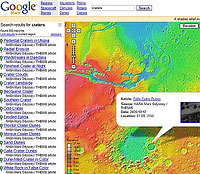 You can also track the landing sites of failed and successful space missions and find the probable crash landing site of the much loved – but totally unsuccessful – Beagle 2 mission.
You can also track the landing sites of failed and successful space missions and find the probable crash landing site of the much loved – but totally unsuccessful – Beagle 2 mission. In what some are viewing as a challenge to Microsoft’s Office software, Google has dipped into its deep pockets and snapped up Upstartle, a small company best known for their online word-processor, Writely.
In what some are viewing as a challenge to Microsoft’s Office software, Google has dipped into its deep pockets and snapped up Upstartle, a small company best known for their online word-processor, Writely. Blog announcements
Blog announcements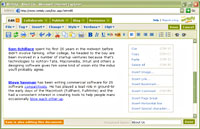 “That could provide enough revenues to pay for the acquisition in months and provide an interesting diversion to keep Microsoft looking over its shoulder,” said Bradshaw and Mitchell, adding that Writely’s integrated collaboration and blogging tools could also prove useful resources for Google’s hugely popular Blogger service.
“That could provide enough revenues to pay for the acquisition in months and provide an interesting diversion to keep Microsoft looking over its shoulder,” said Bradshaw and Mitchell, adding that Writely’s integrated collaboration and blogging tools could also prove useful resources for Google’s hugely popular Blogger service. Google has struck up a partnership with the US National Archives to digitise their historic movie collection and provide free access to the public through their video search service.
Google has struck up a partnership with the US National Archives to digitise their historic movie collection and provide free access to the public through their video search service. “Our new strategic plan emphasises the importance of providing access to records anytime, anywhere. This is one of many initiatives that we are launching to make our goal a reality,” he added.
“Our new strategic plan emphasises the importance of providing access to records anytime, anywhere. This is one of many initiatives that we are launching to make our goal a reality,” he added. Happily, this was not the case, as a Google spokesperson explained: “Video uploaders, using Google Video’s ‘Advanced Options’ feature, can choose to blacklist countries. In this case the uploader blacklisted the US and only the US. When uploading the video the content owner set a preference not to show this content to users in the US.”
Happily, this was not the case, as a Google spokesperson explained: “Video uploaders, using Google Video’s ‘Advanced Options’ feature, can choose to blacklist countries. In this case the uploader blacklisted the US and only the US. When uploading the video the content owner set a preference not to show this content to users in the US.” Internet big boys Google and Skype have teamed up with two venture capital firms, Index Ventures and Sequoia Capital, to invest a mighty wedge into Fon Technology, a Spanish startup looking to build a global network of Wi-Fi hotspots.
Internet big boys Google and Skype have teamed up with two venture capital firms, Index Ventures and Sequoia Capital, to invest a mighty wedge into Fon Technology, a Spanish startup looking to build a global network of Wi-Fi hotspots. For Google and Skype, a deal with FON makes their web-based services more ubiquitously available, with developers gaining access to a new platform for creating and delivering services on a global scale.
For Google and Skype, a deal with FON makes their web-based services more ubiquitously available, with developers gaining access to a new platform for creating and delivering services on a global scale. “As we continue to grow, we will attract consumers for all three foneros categories and achieve our goal of creating a global WiFi nation. This is a great opportunity for ISP’s, bloggers, developers, early adopters, consumer electronics manufacturers and the ‘average Joe or Jane’ with a WiFi connection to make money by letting other foneros connect to the Net safely and simply,” he continued.
“As we continue to grow, we will attract consumers for all three foneros categories and achieve our goal of creating a global WiFi nation. This is a great opportunity for ISP’s, bloggers, developers, early adopters, consumer electronics manufacturers and the ‘average Joe or Jane’ with a WiFi connection to make money by letting other foneros connect to the Net safely and simply,” he continued. After trying to cheat its way to the top of the search engine pile, BMW has been dropped from global search engine, Google.
After trying to cheat its way to the top of the search engine pile, BMW has been dropped from global search engine, Google. As he explains in his blog, search engine ‘bots’ arriving at the BMW site would see a page full of keyword-loaded text, which had been optimised to ensure a high search engine ranking.
As he explains in his blog, search engine ‘bots’ arriving at the BMW site would see a page full of keyword-loaded text, which had been optimised to ensure a high search engine ranking. BMW now have the dubious honour of becoming one of the highest profile companies to have a website effectively blacklisted by Google, by having their all-important PageRank reset to Zero (German camera manufacturer ricoh.de are also set to be delisted).
BMW now have the dubious honour of becoming one of the highest profile companies to have a website effectively blacklisted by Google, by having their all-important PageRank reset to Zero (German camera manufacturer ricoh.de are also set to be delisted). ?The tumbrels are resounding for enemies of Google European head, and former T-Mobile boss, Nikesh Arora, following the “disappointing” financial results. In fact, the results were trivially down, but that was enough, and his head will be anxiously sought by Google in the US, say our stray packet interception team.
?The tumbrels are resounding for enemies of Google European head, and former T-Mobile boss, Nikesh Arora, following the “disappointing” financial results. In fact, the results were trivially down, but that was enough, and his head will be anxiously sought by Google in the US, say our stray packet interception team. And the City doesn’t like people it can’t cut down to size. Give them an excuse, and they will jump on you, which is what happened. That $40m is the excuse they’ve been waiting for. “Misled us with the forecast!”
And the City doesn’t like people it can’t cut down to size. Give them an excuse, and they will jump on you, which is what happened. That $40m is the excuse they’ve been waiting for. “Misled us with the forecast!”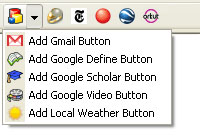 Google have released version 4 of their popular toolbar for Web browsers, with groovy new features to lure more visitors to their sites.
Google have released version 4 of their popular toolbar for Web browsers, with groovy new features to lure more visitors to their sites.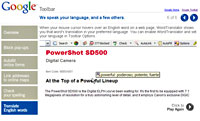 The Bookmarks functionality has also been enhanced to allow users to create and label bookmarks that can be accessed from any computer – something noticeable missing from arch-rival Internet Explorer.
The Bookmarks functionality has also been enhanced to allow users to create and label bookmarks that can be accessed from any computer – something noticeable missing from arch-rival Internet Explorer.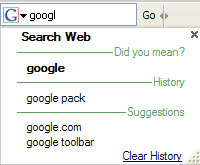 By ramping up the feature set Google is hoping to grab a larger share of Web users (and thus more advertisers) and steal a march on Yahoo and Microsoft who both offer their own toolbars.
By ramping up the feature set Google is hoping to grab a larger share of Web users (and thus more advertisers) and steal a march on Yahoo and Microsoft who both offer their own toolbars.